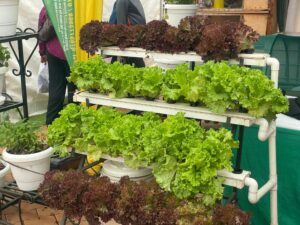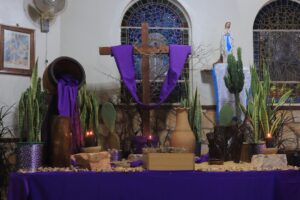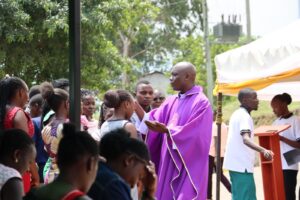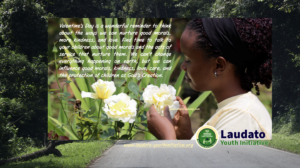Today, the Laudato Youth Leaders, in collaboration with the John Paul II Justice and Peace Center (JP2JPC) and HCFM Maria, embarked on a transformative pilgrimage to the Fruits of Faith Farm, located in Kampala. This initiative is part of our commitment to environmental conservation and sustainable living. The farm, which has branches in Arua, Moroto, and Fort Portal, specializes in horticulture and is dedicated to uplifting the standards of living for young people through hands-on training and employment opportunities.

A Natural Oasis
Upon entering Fruits of Faith Farm, we were immediately enveloped by the beauty of nature, surrounded by a diverse array of plants, birds, and animals. This lush environment serves as a living classroom for young people, where they can learn the importance of preserving our natural resources. The farm features over 20 varieties of bamboo and a range of medicinal plants, including the Mabujja tree, which gained popularity during the COVID-19 pandemic for its health benefits, such as alleviating headaches and flu symptoms.
Empowering Youth Through Agriculture
The primary mission of Fruits of Faith Farm is to equip young people with the skills they need to earn a sustainable living. The farm employs youths and provides them with training in agriculture and environmental conservation. This hands-on experience not only builds their capacity but also instills a sense of responsibility towards the environment. As Laudato Youth, this pilgrimage has been both an exciting adventure and a valuable learning experience, reinforcing the idea that conservation can combat poverty and lead to a brighter future.
Urban Farming Innovations
In an era where urbanization presents challenges, Fruits of Faith Farm embraces urban farming techniques to maximize limited land resources. Here, we witnessed the integration of digital technologies, such as hydroelectric power, to enhance sustainability. Water is supplied to the crops via an innovative system that combines natural resources with organic manure, resulting in healthy and nutritious greens. This approach aligns with our goal of promoting Sustainable Development Goal (SDG) 13, which focuses on climate action.
 Diverse Agricultural Practices
Diverse Agricultural Practices
The farm features various sections that highlight sustainable practices:
– Fish Farming: Natural water holes have been transformed into fishponds, demonstrating innovative aquaculture methods.
– Floriculture: A variety of flowers are cultivated to beautify gardens, showcasing the aesthetic potential of sustainable agriculture.
– Vegetable Nursery Beds: The farm enhances urban food security by growing a variety of vegetables, with lettuce being particularly in high demand. This initiative promotes healthy nutrition within the community.
Eco-Friendly Infrastructure
The farm also boasts eco-friendly cottages built with natural stones that allow water to pass through, preserving the land’s natural topography. This sustainable construction method exemplifies the farm’s commitment to environmental conservation.
Key Lessons Learned
Our pilgrimage yielded invaluable insights:
– Every Action Counts: Each of us has the power to make a difference in our communities through simple actions in environmental conservation.
– Food Security & Conservation: We cannot separate food security from environmental stewardship; they go hand in hand.
– Action Over Words: Real change requires action-oriented efforts rather than mere discussions.
– Long-Term Commitment: Conservation work necessitates passion and patience, yielding results over time.
– Youth Involvement: Engaging young people in conservation efforts is crucial for sustainable progress.
As we prepare for our upcoming Sustainable Living Month program in April 2025, we are excited to launch initiatives encouraging all our clubs and partners to adopt sustainable practices in their daily lives. We will focus on reducing waste, conserving power and water, and implementing the skills we’ve learned during our visit to Fruits of Faith Farm. As Sarah, our Laudato Clubs President, aptly stated, “Together, we can cultivate a greener, more sustainable future.” The visiting team was leaders by Fr. Apire Berry our Laudato Youth Initiative Chaplain, Maria Holy Cross Family Ministries – Uganda, Kirikuwmino Sarah our Clubs President and Innocent B of John Paul II Justice and Peace Centre.
Story by
Sarah for Laudato Youth Media













